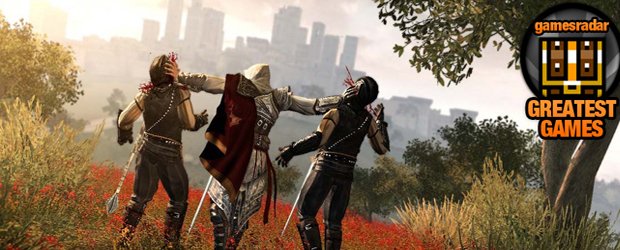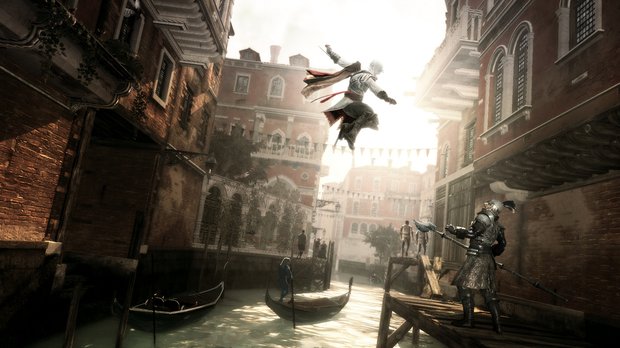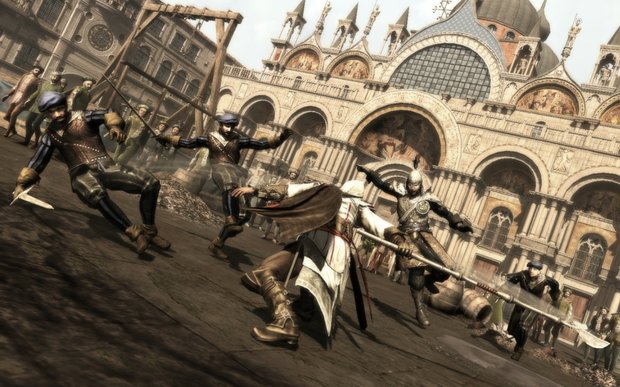Why Assassin's Creed II is one of the greatest games ever made
Requiescat in pace, Templars

Some game sequels are content to polish and improve the established core concepts of their predecessors. Some, however, go the extra mile and straight up embarrass the games that came before them. Such was the case of Assassin's Creed II, which took the erratic pacing and repetition of the original and stabbed them both in the throat. Hard.
The end result was beautiful, ultimately landing AC2 a spot on our list of 100 best games ever made. It took simulated stalking, breathtaking scaling, and parkour stunting to all new heights. Most notably, it did so while introducing the charismatic Ezio Auditore (one of our top video game heroes of all time) and wrapping the whole experience around an expertly paced narrative that melded sci-fi fiction with a deeply personal tale of justice and revenge.
But that tale had an innocent beginning, especially considering our first introduction to Ezio occurred in one of the strangest tutorials ever conceived. Here, he--newly birthed and quite gooey--kicked his arms and legs at the command of his father like some sort of baby genius; and thus the Italian Assassin thrust the blade of affection into our hearts where it has remained anchored ever since.
The opening of the game is fantastic in its pacing and lighthearted nature, weaving between Desmond's present-day plight and Ezio's women-wooing, street-brawling ways. It doesn't rush headlong into a never-ending murder spree, nor does it drag to the point of putting players to sleep. In fact, the first hour or so familiarizes you with Desmond's situation and lets you get to know Ezio--a brilliant (albeit risky) move on part of the developers. Spending so much time with Ezio in his formative years ultimately created a strong attachment to the character, though disaster could have ensued had those interactions been too boring or pointless. Thankfully, they weren't.

We'll never forget that foreshadowing exchange between Ezio and his older brother, Federico, after the two completed a rooftop race: "It is a good life we lead, brother," Federico says, to which Ezio replies "The best. May it never change." A heart-wrenching audio track quiets in the background as the two share their appreciations. "And may it never change us," Frederico responds. Then stuff got dark.
Watching the events that spurred Ezio's maturation from a cocky teenager into one of the best assassin's the Order had ever seen was like watching a good friend fall on hard times. We sympathized during his moments of anger and helplessness, and we did what we could to help him come out on top. The journey was all the more rewarding for it. It was also full of satisfying revenge: Taking out Templars had never been more fun, as AC2 pumped some life into a combat system that had previously relied solely on counter-attacks.

Sure, most engagements could still be completed by counter-attacking, but the sheer number of weapons--each with a slew of unique assassination animations--kept them from feeling too stale. The introduction of the disarming ability allowed for alternative tactics in battle, and a huge arsenal of tools meant you'd be hard-pressed to find much in the way of repetition. The same held true for the crazy variations in mission structure. In one, you'd be tasked with stealth killing a target during a street festival; in another, you'd team up with the affable Leonardo da Vinci and use his flying machine to infiltrate a heavily guarded building.
Sign up to the GamesRadar+ Newsletter
Weekly digests, tales from the communities you love, and more
Ryan was once the Executive Editor of GamesRadar, before moving into the world of games development. He worked as a Brand Manager at EA, and then at Bethesda Softworks, before moving to 2K. He briefly went back to EA and is now the Director of Global Marketing Strategy at 2K.



